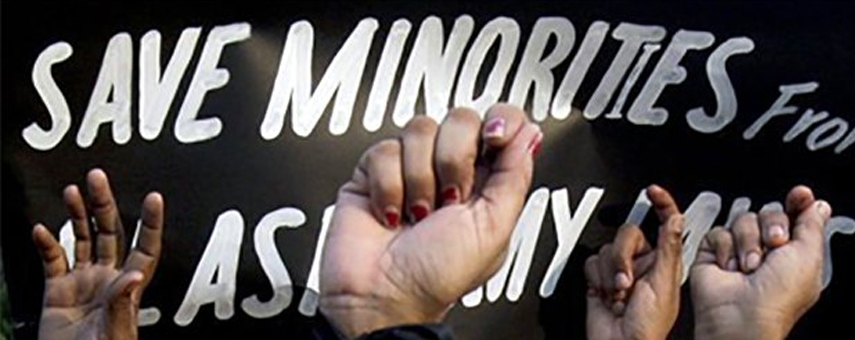“India grants citizenship to 4300 refugees from Afghanistan and Pakistan” read a recent news headline circulating in the media. As a Pakistani, this headline carried more heartache than surprise.
At a time when the Pakistani social media is abuzz with underlining the plight of the minority Rohingya-Muslim community of Myanmar, minorities and marginalized groups in our own backyard are fighting a battle of their survival.
So how come Pakistan, a country established on grounds of secularism, reach this stage of deserting its own? Systematic constitutional marginalization, growing extremist narrative, and alleged state-backed persecution are some of the major reasons.
Between January 2013 and June 2014, up to 3,753 Non-Muslim Pakistanis, especially Hindus, gave up their passports to acquire Indian Visas. Also, the Foreign Policy magazine ranked Pakistan as the third worst state in terms of group grievance, whereas Freedom House, in 2012, categorized the country as partially free for religious practice.
Where Punjab has seen a spike a rise in extremism, resulting in more attacks on minority worship places, Sindh, on the other hand, has been known for forced conversions of the Hindu community.
The Movement of Solidarity and Peace reports that forced conversion is one of the major reasons for minority group grievance in Pakistan. According to the Asian Human Rights watch, an average of 20-25 incidents of forced conversion and kidnappings take place in the Sindh province per month, mostly involving the Hindu community.
Reports of Friday sermons in mosques announcing Jihad against the Hindu community in Sindh have also surfaced in the recent past, making Hindus an easy target for kidnapping and conversion. Additionally, local administration – including Police – is mostly providing impunity to influential culprits by refusing to lodge FIRs and complaints against the perpetrators, adding further to the woes of the victims.
In Punjab, the situation is somewhat different. According to Bar Human Rights Committee of England and Wales, major causes of minority conversions stem from economic disparity and poverty. Converting to Islam – the majority religion – gives a perceived opportunity to move up the social and economic ladder in the country.
But forced conversions are not the only issue faced by minorities in Pakistan. Religious violence and persecutions have also become a norm in the past decade. Minority places of worship are now a constant target of bomb blasts and terrorist attacks whereas graves of Christians and Ahmadis have also been excavated and vandalised. The Institute of Economics and Peace, in its latest ranking, put Pakistan on the third spot for global terrorism index, with attacks on minorities also adding up to the country’s rating.
The role of the state in the current scenario is also worth mentioning. Pakistan’s constitution and legislations have come under enormous local and global debate for marginalizing the minorities. The constitution has gone through a number of amendments over the year introducing legislations that overlooked the country’s minority population.
It was in 1962 when Jinnah’s vision of a secular Pakistan took its blow, when the Pakistan Advisory Council for Islamic Ideology moved to add a repugnancy clause to the constitution asking for laws to be formulated in the light of Quran and Sunnah. This was followed by Zia’s reign of Islamisation where mandatory payment of Zakat and trying to converge the country under one brand of Islam also added fuel to the raging spiral of extremism.
Introduction of the Article 295-295 under the Pakistan Penal Code for criminalising and punishing blasphemy related offences has also lead to vigilantism and vandalism against the minorities. Where before 1986 there were only 16 blasphemy-related cases registered in the country, the number has gone close to 1300 cases in three decades. Instances of Christians burnt alive on allegations of blasphemy have stemmed from these strict Blasphemy laws currently enforced in the country.
Pakistan is among many UN member states to have signed the International Covenant on Civil and Political Rights, yet political and civil rights, especially for the minorities, are becoming a rarity. The constitution forbids any minority member from seeking or taking any high state level position on grounds of religion. This was not the case when Jinnah was at the helm of affairs. Jinnah’s vision of secular Pakistan was endorsed by his appointment of Christian and Ahmadi members in the first cabinet of the country. Such appointments are now seen as symbolic where a minority Parliamentarian could only oversee minority affairs.
Pakistan is currently facing, what Farahnaz Isphani calls, a religious purification; moving towards a State where a certain brand of Islam would only be practiced with limited or no space for the “others”. This thought, coupled with the recent attack on an Ismaili bus, killing 43, leads us towards an important introspection:
Would Jinnah – with an Ismaili religious background – have survived in today’s Pakistan?
By Farooq Yousaf
Farooq Yousaf is a research analyst and consultant, currently pursuing his Ph.D studies in Politics from Newcastle, Australia. His areas of interest and specialisation include tribal identities and nationalism, conflict resolution and counter terrorism. He occasionally writes for national and international news sources such as The Express tribune, The Diplomat, Global Times and The Newcastle Herald. He can be reached at farooq@crss.pk.

